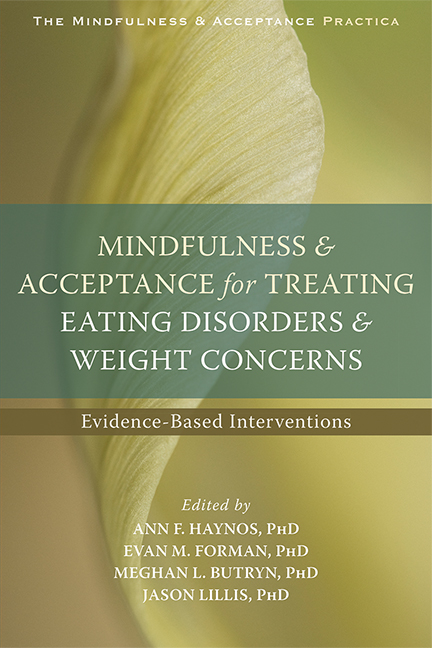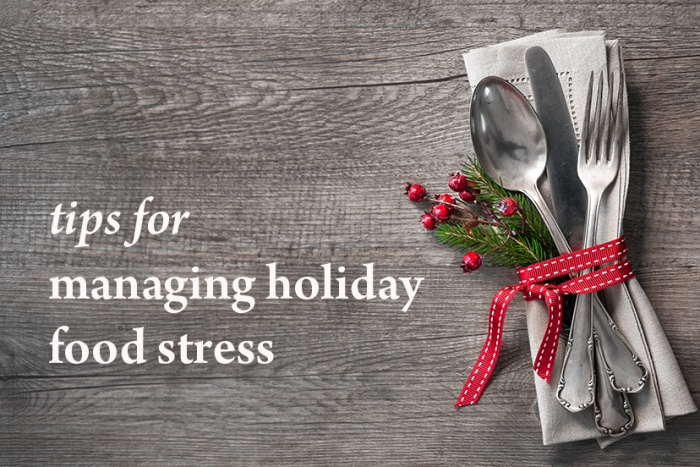There are many sources of stress during the holidays—the chaos of rushing from event to event, the extra expenses, the complicated family dynamics. Then there is food, which is omnipresent during this time of the year. For some, this is one of the most enjoyable aspects of the holidays. However, for those who struggle with disordered eating and/or negative body image, the constant barrage of food-related events can add an extra challenge to the season. If you’re worried about the holiday triggering patterns of disordered eating or self-loathing, I have outlined a few key tips for managing upcoming food-related challenges:
- Focus on your values. During the holidays, food is often used as a bridge to connection. Friends and co-workers give sweets as gifts to demonstrate affection and appreciation. Families share special meals as a tradition to bring everyone together. When eating is stressful, it is easy to lose focus of what is most important. Try taking a pause in a difficult eating situation to reorient to what is dearest to you in that moment. For instance, you may notice the warmth and laughter of your family as they share stories around a meal or your friend’s smile when you compliment his holiday cookies. Reminding yourself of the things you care most deeply about, like connection to loved ones, can help you through a difficult eating situation and can also help to build longer-term positive associations with food.
- Serve yourself a helping of kindness. When a meal is challenging, judging yourself can compound the stress you are already experiencing. For this reason, it is critical to practice understanding and kindness in your self-talk. For instance, when struggling during a meal, you can think, “Of course I feel tense, because this is a scary food for me. There is nothing wrong with feeling this way.” Research has shown that this type of validating self-talk can help you better manage your emotions and get through daunting moments more effectively. It is also important to show yourself kindness with your actions during difficult times. Treat yourself to enjoyable or soothing activities, like a long bath or an afternoon reading a favorite book.
- Use mindfulness to “ride the wave” of your challenging emotions around eating. Research has demonstrated that emotions tend to rise and fall like waves. They start low, build up over time until they reach a peak, and then drop down to where they started. This means that, at the moments when you feel most overwhelmed, your emotion is peaking and about to start decreasing to a more manageable level. When caught in an overpowering emotion, it can be helpful to picture “riding the wave” of the emotion by noticing when the emotion rises to its height and when it begins to fall. This can provide a sense of control over your emotion and reassurance that things won’t always feel as bad as they do in the worst moment.
- Use distraction to get through the most difficult moments. Sometimes, the best we can do is to get through a difficult moment without taking actions that we will regret. If a holiday meal is particularly difficult, and you are feeling strong urges to engage in eating disordered behavior, it can be helpful to distract yourself temporarily to get through the experience. Distractions can include talking to a friend, playing a game, or watching TV during or after a meal. The key to is to completely turn your focus away from the negative thoughts and feelings that are overwhelming you until they become more manageable and you can more effectively problem-solve.
In the end, remember the adage that “This, too, shall pass.” The holidays come and go, along with their culinary accompaniments. The stress of the season will also pass. As I write this, I am sipping a cup of hot chocolate by Christmas tree light with my dog cuddled by side. From this place, I am acutely reminded of why it is so important to plan for and take steps to manage the difficulties that may arise during the holiday season. This work is important because it can provide the foundation to allow you to be fully in the moment to cherish the many positive aspects of this all-too-fleeting season.
 Ann Haynos, PhD, is a clinical psychologist and T32 postdoctoral research fellow funded by the National Institute of Mental Health through the department of psychiatry at the University of Minnesota Medical Center. She is a co-editor of Mindfulness and Acceptance for Treating Eating Disorders and Weight Concerns.
Ann Haynos, PhD, is a clinical psychologist and T32 postdoctoral research fellow funded by the National Institute of Mental Health through the department of psychiatry at the University of Minnesota Medical Center. She is a co-editor of Mindfulness and Acceptance for Treating Eating Disorders and Weight Concerns.



 2024 Peace Playbook: 3 Tactics to Avoid Clashes with Your Partner
2024 Peace Playbook: 3 Tactics to Avoid Clashes with Your Partner